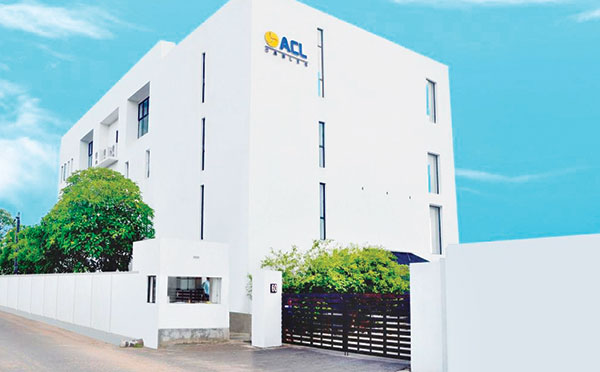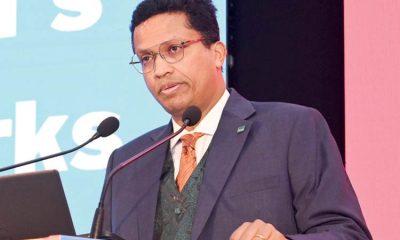Business
ACL Cables wins accolades at LMD Brands Annual Ranking 2022

ACL Cables has been ranked as the most valuable building material brand, according to LMD Brands Annual Ranking 2022 published by Brands Finance Lanka, the premier index of Sri Lanka’s most valuable consumer brands. Notably, this was the second consecutive year for the brand ACL, to achieve the celebrated milestone.Reinforcing the company’s position, ACL was also ranked as the most loved brand in the category of building material – electric, which is a first time accolade of such for the brand.
In comprehensive rankings of consumer brands, ACL was ranked in the 37th position, making it the 7th consecutive year of being classified in the Top 50 Most Valuable Consumer Brands in Sri Lanka. Notably, ACL is also the sole cable company and only electrical appliance company showcased amongst the Top 50 Most Valuable Brands in Sri Lanka
Furthermore, the ACL Cables total brand value for 2022 has escalated by 17% compared to the previous year, boasting a brand rating of AA-.The LMD Brands Annual 2022 rankings are a landmark achievement for ACL’s corporate history. Demonstrating the company’s flourishing market presence, it was listed among the Top 50 Most Valuable Consumer Brands in Sri Lanka, classified as the Most Valuable Consumer Brand in the Building Material sector and the Most Loved Brand in the category of Building Materials – Electric.
Business
Implementation seen as key to Budget 2025’s success

By Ifham Nizam
Despite the 2025 budget’s optimistic outlook, implementation remains the key to its success, warned Nandika Buddhipala, Chief Financial Officer of Commercial Bank PLC.
Speaking at a post budget seminar on Wednesday organized by the National Chamber of Commerce of Sri Lanka, Buddhipala stressed that while tax reforms and fiscal discipline are necessary, businesses will need clarity on regulatory frameworks—especially concerning VAT changes, investment incentives and trade policies.
In response to a question posed by The Island Financial Review, he added: “Budget 2025 sets the foundation for growth, but execution will be the true test. If we can manage debt effectively, encourage exports and attract investors, we can create a resilient economy.”
Buddhipala added: “We appreciate the government’s efforts in aligning the budget with the Public Finance Management Act and the IMF Debt Sustainability Framework. However, it is critical that we remain aware of the persistent debt servicing and interest cost burden.
“Sri Lanka’s high borrowing costs mean that interest payments remain a significant portion of government expenditure. Policymakers should adopt concrete plans for reducing this burden while ensuring economic stability.
“We must create an environment that fosters exports and attracts FDI. The emphasis should be on trade-oriented sectors rather than industries that do not contribute to foreign exchange earnings.
“The government’s aims to strengthen ties with ASEAN nations through participation in the Regional Comprehensive Economic Partnership (RCEP), is a move that could boost trade and investment opportunities.
“We need to expand Double Taxation Agreements (DTAs) beyond the current 46 countries. This would increase investor confidence and facilitate smoother trade flows.
“The proposed Development Bank, which seeks to provide financial support for SMEs and new entrepreneurs, is a positive step but access to finance must be streamlined.
“Providing tailored financial solutions for SMEs is essential. However, ensuring that the Development Bank is efficiently integrated into the existing banking system will determine its success.
“This budget is a strategic response to economic challenges. We need to strike a balance between private sector-driven growth and state intervention to ensure stability and equitable distribution of wealth.”
Meanwhile an official explained in response to another query raised by this newspaper: “The first reading of the budget, which will be followed by a month-long discussion in a budget-related forum, aims to clarify ambiguities and refine implementation strategies. There are a lot of concerns regarding implementation, but this one-month period allows us to fine-tune certain aspects.”
A senior Finance Ministry representative added the following: “We have to consider international expectations and commitments, especially in the context of the International Monetary Fund (IMF) agreements. The recent IMF release of USD 330 million following policy adjustments shows the importance of staying within global economic expectations.
Hasitha Radella of KPMG Sri Lanka, presenting an overview of tax reforms said that as Sri Lanka continues its recovery, the budget is focused on several taxation reforms. Sustained improvements in fiscal management will be key to maintaining growth momentum for the country.
“Clarifications on the Simplified Value Added Tax (SVAT) system and the transition from SVAT to a Risk-Based Refund System that will streamline the VAT refund process to an efficient process are urgent requirements, said Ms. Iyesha Asanthi, Commissioner, Tax Policy & legislation of the Inland Revenue Department.
She said that if any eligible exporter who exports more than 50 percent of total supplies requires VAT refunds under the new risk-based refund system, such a need could be included in a relevant pilot project.
She added that the current VAT threshold is Rs. 15 million per quarter and Rs. 60 million per year at the standard rate 18%. Due to the current situation in the country, the budget proposals of 2025 do not include tax exemptions or concessions. However, the budget proposals made to amend individuals’ tax rates by increasing tax relief from Rs 1.2 million to 1.8 million and the relaxing of tax brackets could benefit individuals, including employees.
Ms. Jayani Wickrama Arachchi, Director, Fiscal Policy Department of Ministry of Finance, Planning and Economic Development said that with the fiscal space being highly constrained, every policy move must be strategic, ensuring key fiscal targets are protected while safeguarding economic stability in the medium term. Interest payments remain a significant burden, accounting for substantial government recurrent expenditure, primarily due to Sri Lanka’s high borrowing costs.
She added: “We need to move ahead despite these challenges.”
Business
SLT-MOBITEL revolutionizes connectivity with new Fibre Speed-Based Unlimited Data Packages

Aligned to the commitment to deliver unparalleled value, reliability, and seamless connectivity to customers across the nation, SLT-MOBITEL presents the latest update as novel Fibre Speed-Based Unlimited Data Packages.
Based on consumption patterns, SLT-MOBITEL’s Fibre Speed Based Unlimited packages delivers speeds from 100Mbps up to 1000Mbps, meeting the diverse needs of customers. Users can enjoy hassle-free internet browsing, streaming, video conferencing, online gaming, with seamless downloading of large files at their fingertips.
SLT-MOBITEL’s enhanced connectivity services enable users to maximize their internet experience. Setting a new standard in Sri Lanka’s connectivity market, SLT-MOBITEL’s Speed Based Unlimited packages respond to the growing demand for high-speed, uninterrupted internet access. These packages are tailored to meet diverse user requirements with various speed tiers, ensuring seamless browsing, smooth streaming, and lag-free gaming. In addition to speed, the new packages offer enhanced reliability, improved latency for a superior online experience. Customers can also enjoy flexible data usage, ensuring uninterrupted video calls, remote work, and e-learning. Furthermore, SLT-MOBITEL provides value-added services such as parental controls, Wi-Fi optimization, and bundled entertainment options, making these packages ideal for modern digital lifestyles.
Business
“Sampath Bank achieves robust financial performance in 2024”

Sampath Bank announced its financial results for the year ending 31st December 2024, demonstrating significant growth and resilience amidst Sri Lanka’s economic recovery.
Financial Highlights:
Profit Before Tax (PBT): Rs 46.7 billion, a 57.0% year-on-year increase.
Profit After Tax (PAT): Rs 27.3 billion, up by 59.4% compared to the previous year.
Group Performance: The Sampath Group reported a PBT of Rs 49.2 billion and a PAT of Rs 28.7 billion, reflecting growth rates of 57.6% and 60.1%, respectively.
Key Financial Metrics:
Dividend: A first and final cash dividend of Rs 9.35 per share has been declared, an increase of Rs 3.50 per share from the prior year.
Return on Equity (ROE): Improved to 17.74% from 12.65% in 2023.
Net Interest Income (NII): Grew by 10.7%.
Loan Growth: LKR loan book expanded by Rs 82.6 billion.
Deposit Growth: LKR deposit portfolio reached Rs 1,247.3 billion by year-end 2024.
Capital Adequacy Ratios: Tier 1 at 16.75% and Total Capital at 19.38%, both well above regulatory requirements.
Operational Performance:
Total interest income for the year was Rs 183 billion, a 10.0% decrease from 2023, primarily due to lower Average Weighted Prime Lending Rate (AWPLR) and reduced interest rates on government securities. Interest expenses declined by 21.4% to Rs 103 billion, attributed to effective deposit repricing and management of Current and Savings Account (CASA) levels. This strategic approach led to a 10.7% increase in Net Interest Income, totalling Rs 80 billion.
The Net Interest Margin (NIM) slightly contracted by 26 basis points, from 5.16% in December 2023 to 4.90% at the end of 2024, due to reduced yields on interest-earning assets amid declining market interest rates.
-

 Sports6 days ago
Sports6 days agoRemarkable turnaround for Sri Lanka’s ODI team
-

 Features6 days ago
Features6 days agoScammed and Stranded: The Dark Side of Sri Lanka’s Migration Industry
-

 Business6 days ago
Business6 days agoUN Global Compact Network Sri Lanka: Empowering Businesses to Lead Sustainability in 2025 & Beyond
-

 News7 days ago
News7 days agoSpeaker agrees to probe allegations of ‘unethical funding’ by USAID
-

 Features5 days ago
Features5 days agoDon’t betray baiyas who voted you into power for lack of better alternative: a helpful warning to NPP – II
-

 Features5 days ago
Features5 days agoTwo films and comments
-

 News3 days ago
News3 days agoCommercial High Court orders AASSL to pay Rs 176 mn for unilateral termination of contract
-

 Editorial7 days ago
Editorial7 days agoCoal giant awakes, but uncertainty prevails











